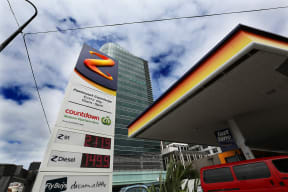Z Energy is rejecting suggestions by the Automobile Association that petrol prices are too high.
The AA is calling on petrol retailers to drop their prices by 2c a litre following what it calls unjustified increases in April.
At the end of April a litre of 91 octane cost $2.18 and a litre of diesel reached $1.50 at most stations.

Photo: RNZ
In a statement, Z Energy says the AA aren't taking into account a maintenance shutdown at Marsden Point which took longer than expected and cost the company millions of dollars.
"We have had to buy urgent 'spot' import cargoes to bring into New Zealand at considerable cost, we've had to truck fuel around the country to make sure it goes where it was needed - again at considerable cost - and we've had to export heavy oil residues at the refinery at a loss in order to keep the country moving with a reliable fuel supply," Z says in its statement.
"At the same time, it has also been costing Z fuel margin, through the refinery not operating over the period."
Z Energy says the costs of the delay at Marsden Point aren't captured by the AA's importer margin.
AA spokesperson, Mark Stockdale says it's the first time he can remember an oil company using Marsden Point as an "excuse" not to drop fuel prices.
"They're saying their costs have increased at Marsden Point so they want to pass those costs on," he said.
"What happens at Marsden Point should not affect the price that we pay at the pump, because in the past when the fuel companies have been making lots of money from Marsden Point they have never turned around and said 'well we're going to pass those savings that we are making onto motorists at the pump'."
"The costs or the profits at Marsden Point ... should not affect the retail price."
The country's four major fuel companies - Z Energy, BP, Mobil and Chevron - use the refinery to supply fuel to New Zealand.
Mr Stockdale says about half the petrol sold in New Zealand is imported and the rest is manufactured at Marsden Point.
But the price of that fuel is sold at the international commodity price.
So when the international commodity price is high, companies manufacture fuel at Marsden Point for less than the commodity price and make a tidy profit, Mr Stockdale says.
But if the commodity price falls internationally, the cost of manufacturing fuel at Marsden Point is higher than the commodity price, so technically they lose money, he says.
Mr Stockdale says given falling commodity prices and the high New Zealand dollar, oil companies should drop their prices.
He says the last time their margins - the difference between retail prices and costs - were this high, they cut pump prices.
But Z Energy says the cost of imported fuel rose in April and it didn't pass on the full extent of those increases to consumers.
"The decision to keep costs down as much as we could during the holiday period impacted on our margins so at this point we are also taking a cautious approach to lowering prices."
It says it will be monitoring the situation and if the trend continues down it will pass on that decrease at the pump.
BP and Mobil did not return calls and Chevon released a statement saying it was up to individual retailers to set the petrol price, based on market conditions.

